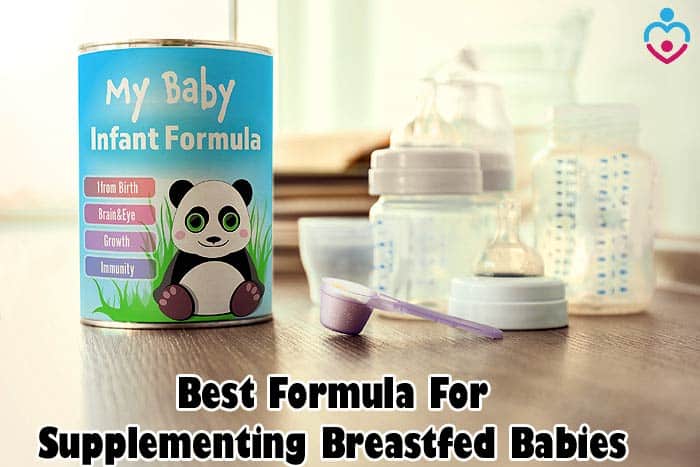
Even if you breastfeed your baby, there are situations when you might need to supplement your baby's diet with formula as well. But finding the right balance between breastmilk and formula is not an easy task.
You will need to know what formula is the best for your baby and why. We are going to discuss all you need to know you you are feeding your baby with both breastmilk and formula.
Enfamil reaches more goals regarding your baby's health with the Reguline Constipation formula.
- It reduces constipation, which can be challenging to manage in babies who are younger than 6 months.
- You can find this formula almost everywhere, as it is a prevalent one.
- It is rich in Iron and has protein that is easy to digest.
- The fact that you can get a bigger pack of formula will be very convenient for you over time.
- You will see your baby forgets everything about constipation in less than a week, once you start giving them this formula.
.
Jump to:
Why do I need to supplement breastfed babies?

The decision to supplement your baby's diet with formula if you are breastfeeding is mostly yours. And many reasons could lead you to this solution.
Feeding your baby with both breastmilk and formula can bring many benefits to both of you as long as you do it right.
- Your milk doesn't have enough nutrients. This is the most substantial reason a mother might choose to supplement a breastfed baby's diet with formula. If you have an iron deficiency, which is the most common in breastfeeding mothers, you might need to find a formula rich in iron. The same goes for any other type of deficiency you might have.
- You might not have the time yo pump as often as you need to. If you go back to work, pumping becomes a challenge. So does scheduling your baby's meals. If this is too much for you, there is nothing wrong with adding some formula meals to your baby's diet.
- If your baby doesn't suck the right way. Your little one might latch good for the morning meal and the evening meal, but what should you do during the day when they are not so still, and they seem to have problems eating? This is the time when you might consider giving them a bottle of formula rather than breastfeeding them. You could put your breastmilk in a bottle too in this case, but most often, babies tend to get slow at latching because they need a change as well. So, going for formula milk will give them the best of both worlds.
![]()
Alternating Breastmilk and Formula

If you are alternating breastmilk with formula milk, you should be aware of the impact such a diet will have on your baby. Your child might also react differently to a bottle of the formula than you expect.
- Your baby might refuse to drink from the bottle. This is not the norm for all babies, but if you breastfeed your infant for a while and you introduce a bottle of formula to them, they might not be thrilled. You can try to let your partner or baby sitter give them the bottle. That way, they don't associate it with you because babies expect breastmilk from their mothers.
- The formula takes longer to digest. You will notice that breastmilk meals are more comfortable to digest for your baby than formula meals. Therefore, they will not get hungry as fast after you feed them a bottle of formula. So, you might change the meal schedule a little bit as you introduce formula meals.
- The bowel movements might change. When you start alternating breastmilk meals with the formula, you will notice that the bowel movements will change. Your baby might not have a dirty diaper as often if they eat formula too. Also, the color and odor of the poop might vary as it might be firmer, darker, and have a stronger smell to it.
- The adjustment period should last around a week. The first week of alternating breastmilk with formula is the hardest. After these days, your baby will get in a pattern, and you will know just what to expect from them. They will anticipate both the breastfeeding meals and formula ones.
![]()
What to look for in the formula?

If you want to give your baby the best formula for their needs, you need to take into account several factors.
- Check the ingredients. You want a formula that has all the nutrients your baby needs in one meal. This should replace what your breastmilk brings to them, and more! Check the list of ingredients and make sure it doesn't contain any GMO or harmful chemicals. The formula you give your baby should be as close as possible to the structure of your breastmilk.
- Look for the recommended age. There are different formulas for different ages. This happens because your baby will have different needs at 4 months than they have at 8 months, for instance. If you are supplementing breastfeeding meals with formula, make sure to use the age appropriated type of product. This is important to give your baby exactly the nutrients they need for their age, and in quantity they need them.
- What are the main effects of the formula? Some formulas are excellent for treating constipation, while others are good for Iron deficiency. Others are richer in protein and Omega 3. If you know your baby's needs, you will find it easier to choose just the formula that will work for them. Nowadays, you can find all types of formulas for all types of babies!
- Find a formula that has what your breastmilk doesn't. One of the reasons you might end up supplementing your baby's breastfeeding meals with formula is that your milk lacks a specific vitamin or Iron or even protein. All these are important for your baby, and if they don't get them from you, they have to get them from the formula. So, use a formula that has the element you are missing in your breastmilk and give your baby complete nutrition each day!
![]()
How to introduce formula to the breastfed baby?

You know that your baby needs a formula supplement. But how to add it to their diet? Not all babies are as receptive to a different type of milk when they are younger than one year. So, here are some tricks that will help you!
- Add it to their diet slowly. Instead of giving your baby a bottle of the only formula at once, make a mix of 25% formula and 75% breastmilk. That way, they will not be bothered by the new taste, and they might even get interested in the slightly unique flavor they are drinking. Once they get used to this ration (which takes about three or four days), you can increase it to 50% breastmilk and 50% formula. And so on until you give them a bottle with 100% formula.
- Be patient and find the best formula. Not all powder formulas taste the same. Try buying small cans at first and see which one your baby likes. This takes some time and skills for a mother, but if you get to know your baby, it will become easier. If your baby refuses the bottle of formula directly, it might be because they don't like the taste of it. If you are trying for several days and they still don't drink it, you might want to give a different brand a try!
- Mix it with their cereal. This is for babies older than six months, but it works in most of the cases. If they refuse the bottle of formula, try mixing it with their bowl of cereal. Since both the formula and the cereal will be new to them, chances are they will be more interested in this combination. This works great if you know they like their cereal already!
- Choose your time wisely. Your baby might not want formula as their first meal in the morning, or the last one in the evening. That's when most of them need the breastmilk. But in the middle of the day, they drink it easier. They are awake and more distracted, so they might get even curious about this new formula you are giving them. You can also try to feed them a bottle of formula when they are more hungry than usual. A hungry baby will eat and be less pretentious than one that is not so hungry!
![]()
Can you mix formula and breastmilk?
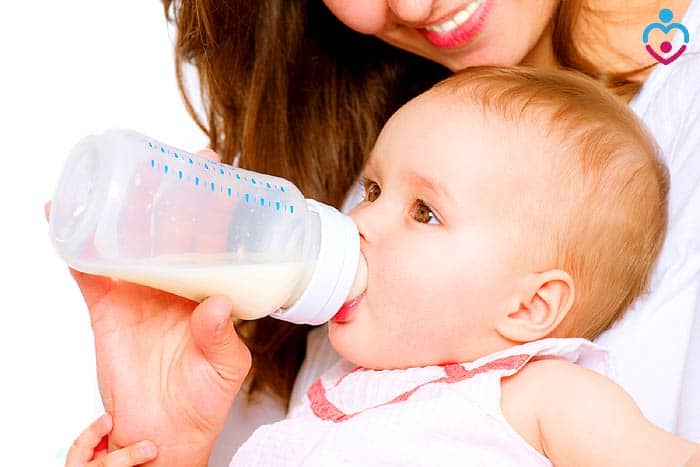
Yes, you can mix breastmilk with formula.
- Not only that, you can mix it, but if your baby refuses the formula, you should mix it.
- Mixing a little formula with your breastmilk will be a smoother start to this transition.
- As your baby starts drinking it more, you can increase the quantity of formula and decrease the part of breastmilk. You continue this until they drink bottles of just formula.
![]()
Best Formula For Supplementing Breastfed Babies
The following formulas are the best that you can find on the market if you need to supplement your baby's diet!
1. Similac Advance Infant Formula with Iron, Powder
Similac is a great brand and a very reliable one in terms of baby formula. This one is a good option if you are looking to supplement your baby's breastfeeding with formula.
- This formula contains no artificial flavoring or harmful chemicals. You can give it to your baby as often as they are hungry without having any concerns.
- It accommodates the needs your baby has in the first year of life as it is very rich in nutrients.
- This powder formula also contains a lot of Iron, so if you have an iron deficiency, you can rely on it. Your baby needs Iron to grow harmoniously.
- It is also rich in vitamin E, DHA, and Lutein, along with other essential nutrients to support your baby's growth.
- Supports the brain development as well as the eye development and resembles the benefits your baby gets from breastmilk.
- Perfect for alternating with breastmilk as it resembles the same benefits.
- Recommended for babies up to one year old.
- No artificial ingredients.
- Rich in nutrients.
- Supports brain and eye development.
- It might have a strong taste that not all babies will like.
![]()
2. Baby's Only LactoRelief with DHA & ARA Toddler Formula
Another excellent formula you can use to supplement your baby's meals is this one from Baby's One.
- It contains organic certified DHA and ARA. You can rely on this formula for just a few of your baby's meals or even all of them.
- A great option to support your baby's eye and brain development. It also boosts their immune system and brings a lot of nutrients to their diet.
- If your baby is sensitive to lactose, this formula is perfect for them. It contains only organic ingredients that will not harm your baby at all. There are no chemicals included in this formula.
- This formula was awarded by the CleanLabelProject.org as one of the best on the market in terms of pure ingredients.
- It doesn't contain any GMO, palm oil, or corn and glucose syrop. This formula is also BPA free and completely safe for your little one!
- It is made in the USA and respects the highest standards in the industry.
- Organic ingredients.
- No GMO or BPA added.
- Recommended for babies that have a sensitivity to lactose as well.
- Supports brain and eye development.
- Boosts the immune system.
- It might not be so accessible in brick and mortar stores like other products.
![]()
3. Enfamil PREMIUM Non-GMO Gentlease Infant Formula
This formula from Enfamil will go great if you alternate it with breastmilk meals. It is relatively easy to find it in stores, and chances are that your little one will love it.
- You will love the fact that this formula is very similar to breastmilk. Your baby might not even notice the difference in it. Most babies adapt to this formula faster than they would adapt to other formulas.
- It will reduce gas, fussiness, and irritability in infants from the first day they try this formula. Your baby will sleep better, and they will be in a better mood as well.
- This formula is clinically tested and approved by the best pediatricians in the industry. It is an excellent alternative to breastmilk as it contains all the needed nutrients.
- Very rich in Omega 3 DHA and other 30 nutrients that will help your baby grow and stay healthy.
- All ingredients are non-GMO and entirely safe for your little one.
- Very similar to the breastmilk.
- Rich in Omega 3 DHA.
- Easy to find it on the market.
- Recommended by pediatricians.
- Non-GMO ingredients.
- It has a strong flavor, and some babies might not like it.
![]()
4. Gerber Good Start Gentle (HMO. Non-GMO Powder Infant Formula
This Gerber powder formula is one of the best to use if you are planning to alternate it with breastmilk.
- It is perfect for babies up to 12 months old. So you can give your baby this formula along with your breastmilk since they are born.
- This formula is rich in protein, which is excellent if you are a vegetarian or vegan breastfeeding mother. It contains all the nutrients your baby needs to stay healthy.
- After six months, you can mix this formula with cereal or other purees to give your baby a wide variety of meals.
- It is a non-GMO formula, and it doesn't contain any chemicals that could be bad for your little one.
- Recommended for babies up to 1-year-old.
- You can mix it with cereal or other food.
- Rich in protein.
- Non-GMO formula.
- Doesn't contain any harmful chemicals.
- It might dissolve harder than other powder formulas.
![]()
5. Enfamil Reguline Constipation Baby Formula Milk Powder
The last but definitely not the least powder formula you can alternate with breastmilk meals is this one from Enfamil.
- You will love the fact that it comes in bigger containers than other formulas so you can get a box for the entire month!
- It is rich in proteins that your baby can digest quickly. So, if they get constipated often, this formula is the best to try.
- This formula is great for babies in the first year of life. You can alternate it with your breastmilk, or you can rely only on this powder. Your baby will get all the nutrients they need from it.
- Thanks to Omega 3 in it, this formula is excellent for brain development. It supports your baby's growth and immune system.
- It is also rich in Iron, which is a great solution if you have an iron deficiency.
- Contains over 30 different nutrients.
- It is easier to digest.
- Reduces constipation.
- Best for the first year of life.
- Supports brain development.
- Some babies don't like this if it is mixed with cereal.
![]()
The best formula to alternate with breastfeeding meals is the Enfamil Reguline Constipation Baby Formula. You will not regret investing in it.
Supplementing breastfeeding meals with formula meals is a great strategy to have the best of both worlds. Your baby will have all the nutrients they need to grow strong and healthy.
You will also have more time for yourself or to go to work with fewer concerns. If you do this right, there are only benefits to be enjoyed in this combination!
Remember always to ask your doctor if you have any concerns. They will recommend you the best formula to try and the best way to go about it!
![]()
Key References
- "Breastfeeding | womenshealth.gov". Accessed January 18, 2020. Link.
- "How to combine breast and bottle feeding - NHS". Accessed January 18, 2020. Link.
- "Types of formula milk - NHS". Accessed January 18, 2020. Link.
- "Why we shouldn't demonize formula feeding - Harvard Health Blog - Harvard Health Publishing". Accessed January 18, 2020. Link.
- "Are You Allowed to Mix Formula With Milk for a Baby? | Hello Motherhood". Accessed January 18, 2020. Link.





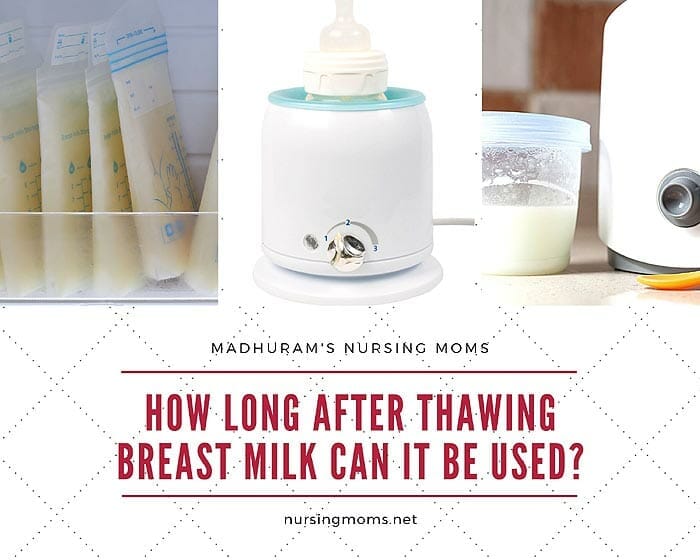



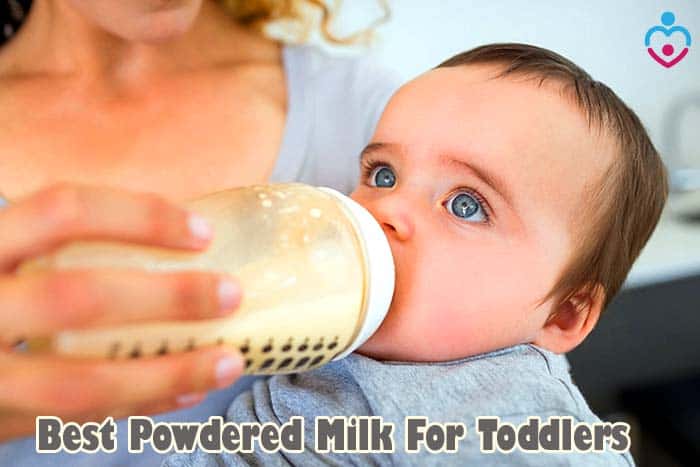


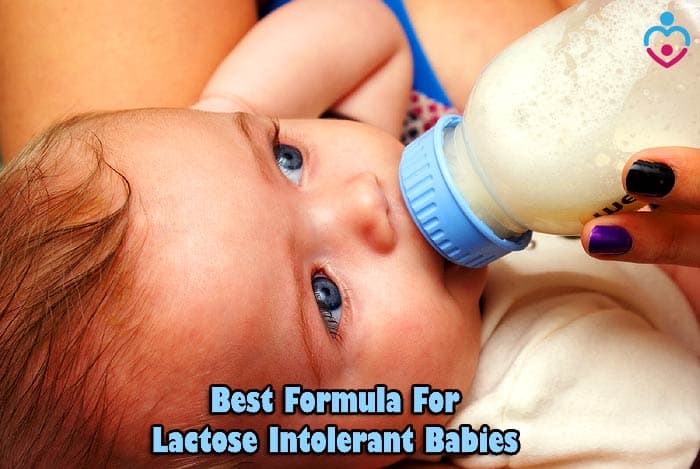
Leave a Reply